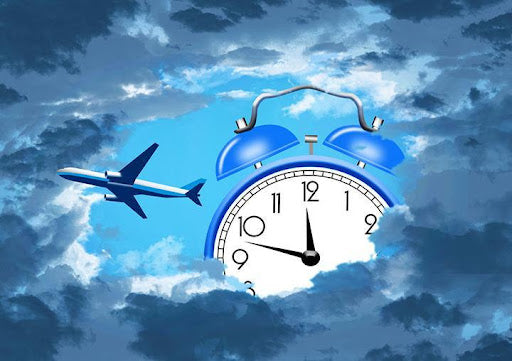
Capable of affecting anyone who travels across multiple time zones, jet lag disorder is a temporary sleep problem that occurs when the body’s internal clock is out of sync with the new time zone. Both eating times and amount of light exposure can act as cues for the internal clock of our body.
Characterized as a circadian rhythm sleep disorder, jet lag disorder can cause sleep problems, a lack of concentration, and fatigue.
In this article, you’ll learn more about the symptoms, causes, and treatments of jet lag disorder.
Jet Lag Disorder Symptoms
Occurring upon disturbance in the sleep-wake patterns, jet lag can make you feel:
- Drowsy
- Irritable
- Disoriented
- Tired
- Lethargic
It can even cause excessive daytime sleepiness or an inability to fall asleep.
When does Jet Lag Occur?
Our body is capable of naturally adjusting to 1 to 1.5 changes in time zones in a day. If you cross two or more time zones, then some symptoms of jet lag can appear. Although the effect differs on the basis of the direction you’re travelling, the difference isn’t significant.
Symptoms of jet lag may include:
- Fatigue
- Excessive daytime sleepiness
- Difficulty falling or staying asleep
- Problems with waking up in the morning
- Poor sleep quality
- Reduced physical and mental abilities
Rare symptoms of jet lag may include:
- Nausea
- Dizziness
- Digestive system problems
- Anxiety
- Changes in appetite
- Excessive nighttime urination
Regular disruption to the body clock can increase your risk of various health conditions, but this isn’t backed by research yet.

Tips to Prevent Jet Lag Disorder
You can adjust certain things that can reduce your likelihood of experiencing jet lag. Here are some tips that can help you to minimize the impact of jet lag:
- Drink a good amount of water while travelling.
- Limit your intake of caffeine and alcohol while travelling
- Stretch & exercise regularly
- Use an eye mask to avoid light and fall asleep fast
- Maintain a consistent sleep schedule in sync with your travelling time
- Spend some time outdoors, as natural light can help to reset your body clock
- Exercise to get your body tired
- Try to sleep 1-2 hours earlier than your usual sleep time in the last few days before travelling.
Causes of Jet Lag Disorder
Let’s understand jet lag in more detail by understanding the body’s circadian rhythm:
What is the Circadian Rhythm?
Involved in setting the biochemical processes of the body, the circadian rhythm is the 24-hour cycle of our body. It regulates the hormonal function of the body.
The circadian rhythm is mostly regulated by light exposure and time zone. When your time zone changes immediately, your body can’t make sense of anything other than its own wants & needs. We need to come together and take matters into our own hands.
Understanding the Clock Inside
Suprachiasmatic nucleus (SCN), located in the hypothalamus, keeps track of time. It can notice changes in the time zone.
SCN consists of two groups:
- One keeps track of deep sleep and fatigue
- The others keep track of REM (rapid eye movement) sleep
When the two clocks are out of sync, your body finds it difficult to fall or stay asleep. It can take some time for the two internal clocks to come back in sync, upon which the symptoms disappear.
Factors that Impact the Body Clock
There are certain factors that can impact the body clock. Light plays a very important role in defining the sleep and wake cycle. Your body usually adjusts its inner processes, including hormone secretion, according to light exposure.
Certain situations can put your body’s internal clock out of sync, situations that include:
- Travelling across different time zones
- Working night shifts or changing shifts frequently
- Sleep disorders
Jet lag disorder is related to travelling across different time zones in a small amount of time. Until the body clock recalibrates and gets back into sync, you feel the symptoms of jet lag disorder.
Alcohol and Caffeine in Jet Lag Disorder
According to the WHO, people should avoid consumption of alcohol and caffeine when travelling across time zones in a flight, as they can worsen your symptoms.
When the symptoms get exacerbated, people sometimes experience dehydration and poor sleep quality. Also, don’t take heavy meals as they can lead to discomfort when dealing with jet lag disorder.
Severe Symptoms of Jet Lag Disorder
Severe symptoms of jet lag disorder may occur because of a lack of oxygen. At higher altitudes, some people experiencing jet lag complain of altitude sickness and dehydration.
During flights, less oxygen may reach people's brains as the pressure is lower than that at the sea level. This can lead to a lack of oxygen, which can lead to jet lag.
Jet Lag Treatment
There’s no medical treatment for jet lag yet. However, there are certain options and tricks you can use to relieve symptoms and reset the body’s internal clock faster.
Here are certain things that you can do to relieve your symptoms of jet lag disorder:
- Use melatonin supplements
- Certain benzodiazepines that induce sleep
- Stimulants, such as caffeine
- Adjust mealtimes during flight
While certain drugs and supplements can help you relieve symptoms faster, you should only take them after consulting your healthcare provider.
While many people use sleep aids and melatonin, there isn’t sufficient evidence to back their effectiveness. However, there’s no adverse effects of using either.
Conclusion
Jet lag disorder can be very difficult to deal with. You may feel nauseated and dehydrated. But the symptoms usually disappear within a small amount of time. So employ the tips provided in this article to resolve your symptoms of jet lag disorder.












